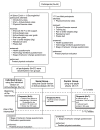Tablet-based strength-balance training to motivate and improve adherence to exercise in independently living older people: a phase II preclinical exploratory trial
- PMID: 23939401
- PMCID: PMC3742406
- DOI: 10.2196/jmir.2579
Tablet-based strength-balance training to motivate and improve adherence to exercise in independently living older people: a phase II preclinical exploratory trial
Abstract
Background: Reaction time, coordination, and cognition performance typically diminish in older adults, which may lead to gait impairments, falls, and injuries. Regular strength-balance exercises are highly recommended to reduce this problem and to improve health, well-being, and independence in old age. However, many older people face a lack of motivation in addition to other strong barriers to exercise. We developed ActiveLifestyle, an information technology (IT)-based system for active and healthy aging aiming at improving balance and strength. ActiveLifestyle is a training app that runs on a tablet and assists, monitors, and motivates older people to follow personalized training plans autonomously at home.
Objective: The objectives were to (1) investigate which IT-mediated motivation strategies increase adherence to physical exercise training plans in older people, (2) assess the impact of ActiveLifestyle on physical activity behavior change, and (3) demonstrate the effectiveness of the ActiveLifestyle training to improve gait speed.
Methods: A total of 44 older adults followed personalized, 12-week strength and balance training plans. All participants performed the exercises autonomously at home. Questionnaires were used to assess the technological familiarity and stage of behavior change, as well as the effectiveness of the motivation instruments adopted by ActiveLifestyle. Adherence to the exercise plan was evaluated using performance data collected by the app and through information given by the participants during the study. Pretests and posttests were performed to evaluate gait speed of the participants before and after the study.
Results: Participants were 75 years (SD 6), predominantly female (64%), held a trade or professional diploma (54%), and their past profession was in a sitting position (43%). Of the 44 participants who enrolled, 33 (75%) completed the study. The app proved to assist and motivate independently living and healthy older adults to autonomously perform strength-balance exercises (median 6 on a 7-point Likert scale). Social motivation strategies proved more effective than individual strategies to stimulate the participants to comply with the training plan, as well as to change their behavior permanently toward a more physically active lifestyle. The exercises were effective to improve preferred and fast gait speed.
Conclusions: ActiveLifestyle assisted and motivated independently living and healthy older people to autonomously perform strength-balance exercises over 12 weeks and had low dropout rates. The social motivation strategies were more effective to stimulate the participants to comply with the training plan and remain on the intervention. The adoption of assistive technology devices for physical intervention tends to motivate and retain older people exercising for longer periods of time.
Keywords: aged; delivery of health care; exercises; mobility; motivation; tablet.
Conflict of interest statement
Conflicts of Interest: None declared.
Figures






References
-
- Spirduso WW, Cronin DL. Exercise dose-response effects on quality of life and independent living in older adults. Med Sci Sports Exerc. 2001 Jun;33(6 Suppl):598–608. - PubMed
-
- Johnson RJ, Wolinsky FD. The structure of health status among older adults: disease, disability, functional limitation, and perceived health. J Health Soc Behav. 1993 Jun;34(2):105–21. - PubMed
-
- Malmberg JJ, Miilunpalo SI, Vuori IM, Pasanen ME, Oja P, Haapanen-Niemi NA. A health-related fitness and functional performance test battery for middle-aged and older adults: feasibility and health-related content validity. Arch Phys Med Rehabil. 2002 May;83(5):666–77. - PubMed
-
- Malmberg J, Miilunpalo S, Pasanen M, Vuori I, Oja P. Characteristics of leisure time physical activity associated with risk of decline in perceived health--a 10-year follow-up of middle-aged and elderly men and women. Prev Med. 2005 Jul;41(1):141–50. - PubMed
Publication types
MeSH terms
LinkOut - more resources
Full Text Sources
Other Literature Sources
Medical
Miscellaneous

